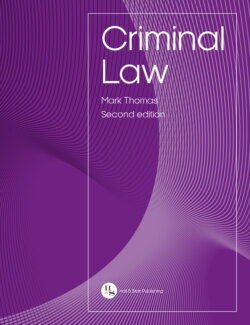Читать книгу Criminal Law - Mark Thomas - Страница 34
На сайте Литреса книга снята с продажи.
1.6.4.2 Draft Criminal Code
ОглавлениеMany countries, mostly civil law countries, have a Criminal Code, which sets out the definitions for all criminal offences, defences and procedures. These Codes are comprehensive in nature. The Law Commission, for many years, has proposed the adoption of a Criminal Code for England and Wales. In 1989, the Law Commission proposed a draft Criminal Code (‘Criminal Code for England and Wales’ (Law Com No 177, 1989)) which would have codified the majority of the existing laws on the general principles of criminal liability and specific offences against the person, property and those relating to public order. The Code lays out the fundamental rules of the criminal law and provides detailed definitions, explanations and circumstances to aid in the understanding of the criminal law.
Bennion (‘Codification of the Criminal Law – Part 2: The Technique of Codification’ [1986] Crim LR 105) took the view that the proposed reform was over-generalised and incomplete. Particularly, Bennion was critical of the simplified nature of the Code, expressing that ‘you do not simplify by oversimplifying’. Ashworth (‘Codification of the Criminal Law – Part 3: The Draft Code, complicity and the inchoate offences’ [1986] Crim LR 303) furthers this view, contending that an oversimplified version of the Code would have provided judges with too much discretion.
Where relevant in this text, we shall be referring to key proposals made in the draft Code. At the time of writing, Parliament is yet to adopt the Code, and it is unlikely that the Code will ever be adopted, which Child and Ormerod (Smith, Hogan, & Ormerod's Essentials of Criminal Law, 3rd edn (OUP, 2019)) consider to be ‘regrettable’. The Law Commission’s response to this is to produce so-called ‘mini-codes’ that deal with specific areas of legal reform.
